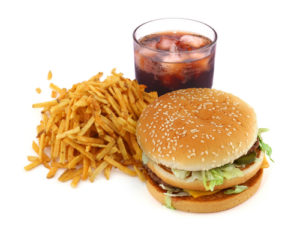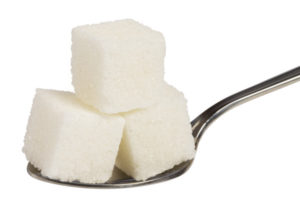 Bottom line: try not to eat processed sweetened foods or drink sodas because high intake is linked to type 2 diabetes. Several studies point the finger in particular to high fructose corn syrup, which is the most frequently used sweetener in processed foods, particularly fruit-flavored drinks and soda. An earlier 2013 study from Europe found that drinking one 12-ounce sugar-sweetened soft drink a day can increase the risk of type 2 diabetes by 22%. Instead eat real whole foods like fruits and vegetables. From Medscape:
Bottom line: try not to eat processed sweetened foods or drink sodas because high intake is linked to type 2 diabetes. Several studies point the finger in particular to high fructose corn syrup, which is the most frequently used sweetener in processed foods, particularly fruit-flavored drinks and soda. An earlier 2013 study from Europe found that drinking one 12-ounce sugar-sweetened soft drink a day can increase the risk of type 2 diabetes by 22%. Instead eat real whole foods like fruits and vegetables. From Medscape:
Added Sweeteners in Processed Foods Tied to Diabetes
A large body of evidence from animal studies and observational and clinical trials in humans suggests that eating processed foods with added sweeteners is contributing to the growing incidence of type 2 diabetes, a new review, published online January 29 in the Mayo Clinic Proceedings, concludes. Thus, "by limiting sugar to 5% to 10% of total caloric intake, the harmful effects of sugar, particularly fructose, on insulin resistance could be minimized," he and his colleagues conclude. This in turn "may protect against diabetes and its complications, including early mortality from cardiovascular causes."
About three-quarters of all packaged foods and beverages in the US contain added sugar, and it is estimated that Americans eat up to 22 to 47 teaspoons of sugar a day, including hidden sugar in processed foods, Dr DiNicolantonio said.
"High intakes of added sugars, especially in the form of sugar-sweetened beverages, are associated with an increased risk of type 2 diabetes." However, at the same time, "people should not be concerned about limiting fructose found in whole foods such as fruits and vegetables," she noted.
The AHA recommends limiting added sugars to no more than 6 tsp (24 g), or 100 calories, per day for women, and 9 tsp (36 g), or 150 calories, per day, for men and cutting sugar-sweetened beverage consumption to no more than 36 ounces, or 450 calories, per week.
From Science Daily:
Added fructose is a principal driver of type 2 diabetes, experts argue
Recent studies have shown that added sugars, particularly those containing fructose, are a principal driver of diabetes and pre-diabetes, even more so than other carbohydrates. Clinical experts challenge current dietary guidelines that allow up to 25 percent of total daily calories as added sugars, and propose drastic reductions in the amount of added sugar, and especially added fructose, people consume.
The totality of the evidence is compelling to suggest that added sugar, and especially added fructose (usually in the form of high-fructose corn syrup and table sugar), are a serious and growing public health problem, according to the authors.
While fructose is found naturally in some whole foods like fruits and vegetables, consuming these foods poses no problem for human health. Indeed, consuming fruits and vegetables is likely protective against diabetes and broader cardiometabolic dysfunction, explained DiNicolantonio and colleagues. The authors propose that dietary guidelines should be modified to encourage individuals to replace processed foods, laden with added sugars and fructose, with whole foods like fruits and vegetables.


 An interesting
An interesting  Another reason to cut back on soda and highly processed foods. Research in mice and women showed that a high-fructose diet during pregnancy may cause defects in the placenta and restrict fetal growth. But the advice in the article was disturbing - rather than giving a drug (allopurinol) to pregnant women with high fructose levels (which is what the researchers suggest), why not focus on giving them nutrition advice and strongly encourage them to avoid or cut back on high fructose products? Especially foods containing high fructose corn syrup (HFCS), such as soda and highly processed desserts.
Another reason to cut back on soda and highly processed foods. Research in mice and women showed that a high-fructose diet during pregnancy may cause defects in the placenta and restrict fetal growth. But the advice in the article was disturbing - rather than giving a drug (allopurinol) to pregnant women with high fructose levels (which is what the researchers suggest), why not focus on giving them nutrition advice and strongly encourage them to avoid or cut back on high fructose products? Especially foods containing high fructose corn syrup (HFCS), such as soda and highly processed desserts. This study was done in mice, but...it may apply to humans. The researchers found that sugar intake in mice comparable with levels in Western diets (in humans) led to increased breast tumor growth and metastasis.They specifically found that
This study was done in mice, but...it may apply to humans. The researchers found that sugar intake in mice comparable with levels in Western diets (in humans) led to increased breast tumor growth and metastasis.They specifically found that  Bottom line: try not to eat processed sweetened foods or drink sodas because high intake is linked to type 2 diabetes. Several studies point the finger in particular to high fructose corn syrup, which is the most frequently used sweetener in processed foods, particularly fruit-flavored drinks and soda. An earlier 2013 study from Europe found that drinking one 12-ounce sugar-sweetened soft drink a day can increase the risk of type 2 diabetes by 22%. Instead eat real whole foods like fruits and vegetables. From Medscape:
Bottom line: try not to eat processed sweetened foods or drink sodas because high intake is linked to type 2 diabetes. Several studies point the finger in particular to high fructose corn syrup, which is the most frequently used sweetener in processed foods, particularly fruit-flavored drinks and soda. An earlier 2013 study from Europe found that drinking one 12-ounce sugar-sweetened soft drink a day can increase the risk of type 2 diabetes by 22%. Instead eat real whole foods like fruits and vegetables. From Medscape: